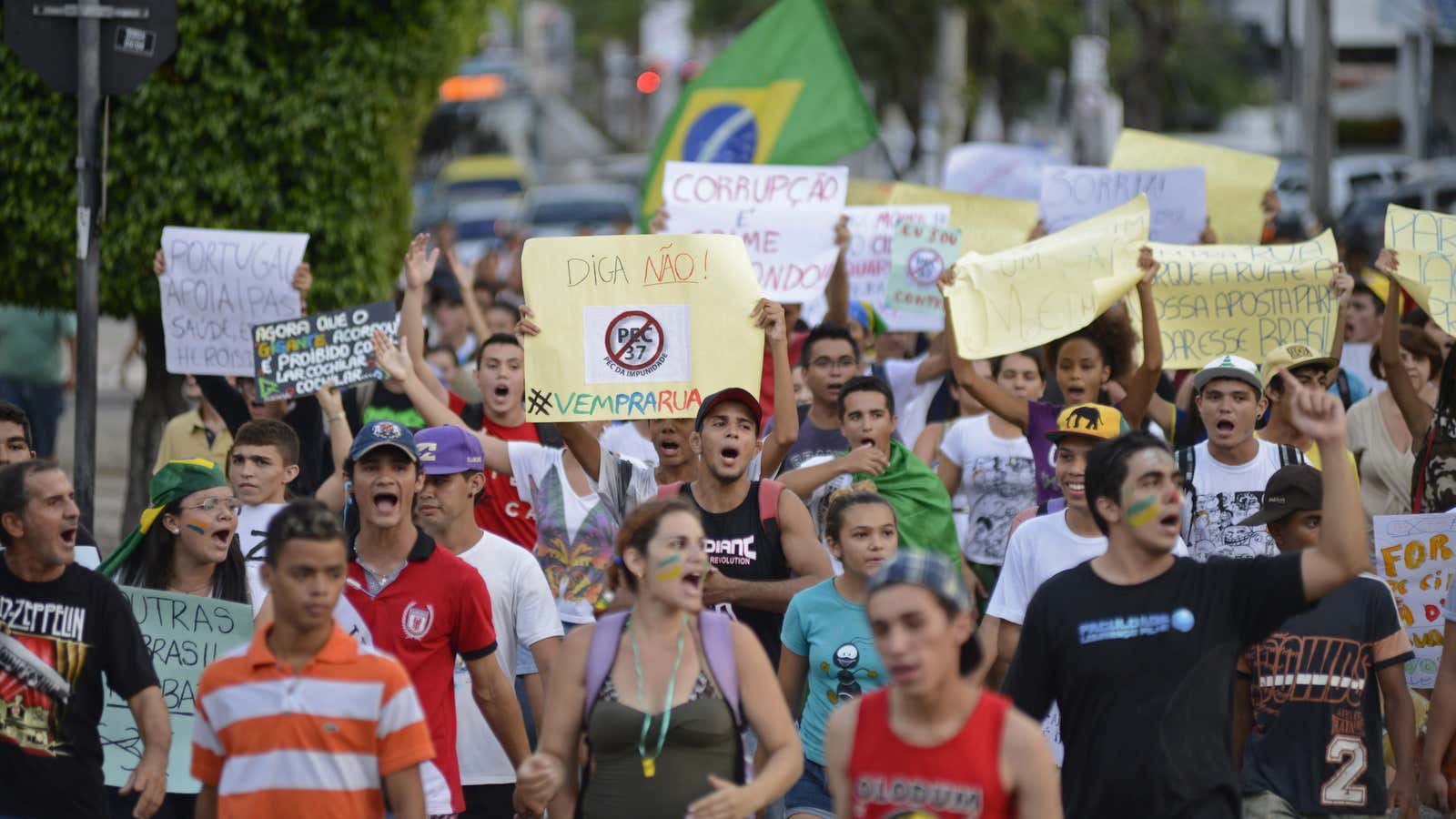Alper, a 26-year-old Turkish corporate lawyer, has benefited enormously from prime minister Recep Tayyip Erdogan’s rule. He is one of millions of young Turks who rode the country’s economic boom to a lifestyle his grandparents could scarcely imagine.
Yet he loathes Erdogan, participated in the Taksim Square demonstrations and is taking part in the new “standing man” protests in Istanbul.
“The prime minister is continuing to blatantly lie about the demonstrations,” said Alper, who asked that his last name not be used because he feared arrest. “People are actually scared that if they stop this momentum, then the government will feel free to exercise more force.”
From Turkey to Brazil to Iran the global middle class is awakening politically. The size, focus and scope of protests vary, but this is not unfolding chaos—it is nascent democracy. Citizens are demanding basic political rights, accountable governments and a fairer share of resources.
The movements may lose their way. The demonstrations will have a limited long-term impact if they fail to become organized political movements. And the violence and criminality that erupted during some protests in Brazil have prompted a popular backlash.
Overall, though, Americans jaded about world affairs should see the activism as positive. The protesters are performing the same role as middle classes have in developed nations. As their standard of living rises, so do their expectations of government.
The political dynamic in each country is different, of course. In Turkey, the protests are not the equivalent of the Arab Spring demonstrations that toppled governments across the Middle East. Nor are they simply a pitched battle between religious conservatives and secular liberals. Instead, they are deeply Turkish—and hugely important.
After decades of the Turkish state reigning supreme, young Turks are demanding pluralism and basic individual rights. The Turkish state should be accountable to the people, they argue, instead of the people being accountable to the state.
“Basic freedoms such as the right to peaceful assembly are undermined by police and government,” Alper said in an email. “There have been no significant repercussions for police officers and their superiors.”
For years, Soli Ozel, a professor of International Relations and Political Science at Istanbul Bilgi University, scoffed at Westerners who viewed Turkey as a model for the Middle East. The new protests, however, make him feel the label may apply.
“After this unprecedented mobilization,” he said in a telephone interview, “we now have a very vibrant and very much alive civil society.”
Brazil presents a different dynamic.The ruling Workers’ Party is left-leaning and its economic reforms have helped the poor and middle class. But now a souring economy, corruption scandals and $12 billion in government spending on 2014 World Cup stadiums has sparked one million people to take to the streets.
Marcelo Ridenti, a leading Brazilian sociologist, said reduced inequality and increased education have raised expectations. The number of university students in Brazil, for example, doubled from 2000 to 2011.
“This generates huge changes in society, including changes in expectations among young people,” he told the New York Times. “They expect to get not only jobs, but good jobs.”
Recent events in Iran are more difficult to discern. While Brazil and Turkey’s political systems are relatively open, Iran’s is tightly controlled. Until last weekend’s presidential election, hard-line religious leaders seemed to have tightened their grip on power after crushing the country’s 2009 Green Revolution.
In a surprise result, cleric Hassan Rohani won a sweeping victory in presidential elections last weekend. Pro-reform and urban Iranians frustrated with the country’s weak economy, isolation and conservative monopoly on power apparently handed Rohani the presidency. Rohani may prove to be more conservative than expected, but his victory prompted thousands of Iranians to take to the streets.
“I am hopeful about the future,” Hoda, a 26-year-old who asked that her last name not be used, told Reuters. “Hopeful that we will have more social freedoms, more stability in Iran, better relations with other countries and hopefully a much better economy.”
Comparing political movements in different countries carries risks. Societies vary enormously. But observers see parallels between Brazil’s protests, India’s anti-corruption movement , austerity protests in Europe, the U.S. Occupy Movement and similar demonstrations in Israel.
My focus on Turkey, Brazil and Iran is driven by recent events and optimism. Positive dynamics are at work in all three nations.
First, the explosive spread of social media played a role in the movements. Networks of like-minded people were able to immediately communicate with one another—and potential recruits. Some online information has been false or restricted, but technological change has unquestionably sped up the pace of political organizing.
Second, all three movements are demanding basic individual rights and accountable government. They want non-corrupt leaders who respect their right to protest, gather and speak freely. From minority rights in Turkey, to fair elections in Iran, to better policing, healthcare and transit in Brazil, protesters want improved governance.
There will be setbacks, excesses and confusion in the weeks ahead. But the burgeoning middle class activism in Turkey, Iran and Brazil should be hailed. Like their brethren in developed countries, they are a check on government excess—and create stronger, more vibrant societies.
This originally appeared on Reuters. More on our partner site:
Scattered protests continue in dozens of Brazilian cities
